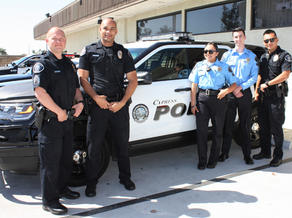
A special meeting held to update the Cypress city council on the COVID budget impact turned into an opportunity for one council member to again question the wisdom of building a new hotel in Cypress.
Overall, while there are unknowns about the future, Cypress budget director Matt Burton said unexpected revenue collections in the final quarter of the last fiscal year has already covered the projected $2.1 million deficit for 2020-21.
Burton said unexpectedly high sales tax collections in the final quarter of the previous fiscal year and additional property tax collections facilitated by the dissolvement of the successor agency combined with a reduction in overall expenses gave the city budget a somewhat expected $4 million boost.
Also, he said salary reduction expenses in the Cypress Police Department and the city overall have caused expenditures to be further reduced.
In addition, Burton said the police department was paying more overtime to its officers because they are currently short ten patrol officers. Nevertheless, the overtime is much less than the salaries of the 10 officers would have been.
City manager Peter Grant said the police department is recruiting, but the market for police officers national is competitive.
Nevertheless, even with the overtime, Burton said the impact has produced a significant savings for the city.
Also, he said about $1 million in federal CARES ACT allocations helped cover the costs of the pandemic, again providing some relief to the budget.
While the additional $4 million has cured the current projected deficit, Burton said long term projections are almost impossible in the current environment.
“It’s really too early to tell about where we are going to be next June,” said Burton, who added that $2.1 million of the excess collections have already been set aside to cover any 2020-21 budget deficit, and the additional $1.9 million could eventually be utilized as necessary.
Regarding revenue, in additional to the property tax boost, Burton said strong online sales, for which Cypress receives a portion from the county, combined with strong home improvement trends led to an unexpected increase in sales tax collections.
In summary, while savings from the police vacancies, among others, led to a $500,000 reduction in expected expenses, the additional sales and property tax collections created the $4 million impact to the city, said Burton.
Burton’s comments regarding a major under-performing revenue source prompted one council member, Stacy Berry, to again question a proposal by Shea Properties which includes a new hotel.
Burton said collections from the Transient occupancy Tax (TOT), paid by hotel guests, is seriously lagging. He said with more than $2 million budgeted, actual collections could fall below half of that amount, and maybe less.
“It’s one of the concerning elements of city revenue,” said Burton, noting that he has been in touch with four of the largest hotel operators in the city. “Business travel is almost non-existent,” he said.
Not only that, but the rates hotels can charge have been reduced, noting that some families who rent rooms with kitchens “just to get away” make up a significant portion of those rentals.
Earlier this year, council members Stacy Berry and Mariellen Yarc pleaded with their colleagues not to approve the Shea Properties proposal because as of now, it is simply not possible to determine the pandemic’s impact on economic trends. The Council, nonetheless, voted 3-2 to allow the project to proceed, with Yarc and Berry voting against.
After listening to Burton discuss the pessimistic hotel outlook, Berry spoke out again, asking about the wisdom of including a new hotel in the Shea Properties 13-acre development, given the scenario.
City manager Peter Grant responded to the question, saying he understood that the Hilton hotel developer for the Shea Properties site had “already paid” a non-refundable fee for the hotel becoming part of the development.
In addition, Grant said it was his understanding that Shea and the hotel developers feel that, by the time the hotel is finally built in two years, the economy would have fully recovered.
In other action, council candidate Frances Marquez pleaded with the city to prepare a presentation to inform citizens as to what is going on with the Amazon proposal.
Marquez said she has learned that there will be 54 shipping docks and “large trucks” involved. She also pleaded with the Council not to vote on the Amazon proposal at the last meeting of the current council, saying there are still too many unknowns for any reasoned decision to be made.
She lives near to the proposed Amazon “last mile” facility and said citizens deserve to know.
